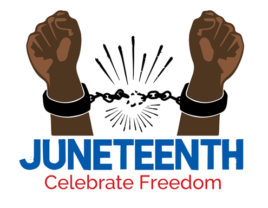Celebrating Juneteenth
 Today, June 19th, is Juneteenth, a holiday commemorating the end of slavery in the United States. It’s an official holiday in 47 states and should be a national holiday all across America.
Today, June 19th, is Juneteenth, a holiday commemorating the end of slavery in the United States. It’s an official holiday in 47 states and should be a national holiday all across America.
African-Americans have celebrated it since June 19th, 1865, when more than 250,000 enslaved people in Texas learned from a Union army general that two years earlier they had gained their freedom through President Lincoln’s signing of The Emancipation Proclamation.
Today, when millions in the U.S. and around the globe are marching for justice here are some suggestions to consider as ways to participate in the celebration of Juneteenth.
Organizers for racial justice are holding a weekend of powerful actions aimed at ensuring we all live up to our ideals of democracy, justice, and equality. — and speak out to end systems that brutalize and punish Black people.
- Today, and throughout the weekend, The Movement For Black Lives is organizing rallies around the country (dates and times will vary). Visit sixnineteen.com to join one of the events happening nationwide this weekend.
- On Saturday, June 20th, Rev. William Barber and the Poor People’s Campaign will mobilize the Mass Poor People’s Assembly and Moral March on Washington — a digital justice gathering to lift up the stories, demands, and solutions aimed at the problems of poor and low-wealth people. This is an online-only event. Learn more and get involved here at june2020.org
- Take some time to reflect, listen, and learn about race and racism — a great place to start is with a selection from Ibram X. Kendi’s Anti-Racist Reading List. I also recommend Common Cause’s reports, Democracy Behind Bars and Zero Disenfranchisement, about how our country’s mass incarceration problem is a major obstacle to the democracy we all deserve.
We’re all part of the process of continual growth, and different folks are at different places along that path– many are even waking up to some of these issues for the first time.
There’s no doubt in my mind that that the most important personal step I can take right now is to renew and redouble my commitment to work for equality in the months and years ahead –by taking some concrete action today.
Roger



Roger, while I commend you for your thoughtful post about Juneteenth, I want to provide one correction. Juneteenth is NOT “a holiday commemorating the end of slavery in the United States.” Instead, Juneteenth marks the official end to slavery in the Southern states. The official end of slavery in the entire United States did not come until December 6, 1865, when the 13th Amendment to the US Constitution abolished it. The Emancipation Proclamation applied only to the Confederate States.
I’d also like to share an additional bit of history with you and your readers. To reunite the nation and end slavery, 365,000+ Union soldiers made the ultimate sacrifice, including 40,000 or so African-American soldiers. I point this out to underscore that Juneteenth is NOT a Black holiday. It is an American holiday we should ALL thoughtfully observe. If we can come together to do that, perhaps we can come together to address the problems our nation faces today.
Michael & Roger,
Thank you both for your informative posts.
I’ve been researching ancestors in Kentucky and learned that slaves in the “border states” i.e. Maryland, Missouri, Delaware and Kentucky were not freed. Many fled north.
By the end of the Civil War, roughly 179,000 black men (10% of the Union Army) served as soldiers in the U.S. Army and another 19,000 served in the Navy. Nearly 40,000 black soldiers died over the course of the war—30,000 of infection or disease. Black soldiers served in artillery and infantry and performed all noncombat support functions that sustain an army, as well. Black carpenters, chaplains, cooks, guards, laborers, nurses, scouts, spies, steamboat pilots, surgeons, and teamsters also contributed to the war cause. There were nearly 80 black commissioned officers. Black women, who could not formally join the Army, nonetheless served as nurses, spies, and scouts, the most famous being Harriet Tubman who scouted for the 2d South Carolina Volunteers.
Because of prejudice against them, black units were not used in combat as extensively as they might have been. Nevertheless, the soldiers served with distinction in a number of battles. Black infantrymen fought gallantly at Milliken’s Bend, LA; Port Hudson, LA; Petersburg, VA; and Nashville, TN. The July 1863 assault on Fort Wagner, SC, in which the 54th Regiment of Massachusetts Volunteers lost two-thirds of their officers and half of their troops, was memorably dramatized in the film Glory. By war’s end, 16 black soldiers had been awarded the Medal of Honor for their valor.
The enlistment of black soldiers eventually led to the formation of what we today call Buffalo Soldiers who served on the “western frontier” following the end of the Civil War, unfortunately fighting another racial minority, Native Americans.
A beautiful post, Roger. It’s so important to awaken within ourself. I too wrote a blog piece on Juneteenth and something amazing has been happening since it went live yesterday: I’ve received 12 requests to connect from new colleagues of color. Now we’re getting to know each other. I’m very grateful for their embrace.